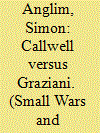| Srl | Item |
| 1 |
ID:
085522


|
|
|
|
|
| Publication |
2008.
|
| Summary/Abstract |
The period from December 1940 through to the spring of 1941 saw the British Army win a series of rapid and decisive victories over Italian and Vichy French forces in North and East Africa and the Middle East. A key feature of these operations was the extensive British use of fast-moving all-arms mobile formations utilising superior speed and mobility to out-manoeuvre considerably larger Italian formations. A number of reasons have been given for the British Army adopting this mode of warfare, but the paper contends that the best explanation is that they were an organic evolution from methods used by the British Army in 'small wars' throughout the early twentieth century, use of mobile 'frontier columns' at the operational and tactical level of war being described and recommended by Callwell himself and visible with the Army in practice in operations in India and the Middle East in particular. The inter-war period saw the combination of this model of warfare with post-First World War military technology, notably tanks, close air support and coordination by wireless. Colonial operations in this period also saw some utilisation of what would later be identified as 'Special Forces' - also used extensively in the Desert War - the most obvious example being Captain Orde Wingate's Special Night Squads in Palestine in 1938.
|
|
|
|
|
|
|
|
|
|
|
|
|
|
|
|
| 2 |
ID:
068781


|
|
|
| 3 |
ID:
076969


|
|
|
| 4 |
ID:
071967


|
|
|
|
|
| Publication |
2006.
|
| Summary/Abstract |
Major General Orde Wingate was a highly controversial figure in his time and remains so among historians. However, his eccentric and colourful personality has drawn attention away from the nature of his military ideas, the most important of which was his concept of long-range penetration, which originated from his observations of his operations in Italian-occupied Ethiopia in 1941, and evolved into the model he put into practice in the Chindit operations in Burma in 1943-44. A review of Wingate's own official writings on this subject reveals that long-range penetration combined local guerrilla irregulars, purpose-trained regular troops and airpower into large-scale offensive operations deep in the enemy rear, with the intention of disrupting his planning process and creating situations regular forces could exploit. This evolved organically from Major General Colin Gubbins' doctrine for guerrilla resistance in enemy occupied areas, and bears some resemblance to the operational model applied by US and Allied forces, post September 2001.
|
|
|
|
|
|
|
|
|
|
|
|
|
|
|
|